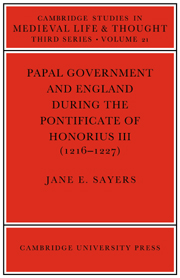Summary
Was Honorius III a continuator or an innovator? The evidence suggests little certain innovation during this pontificate but more a logical, practical and sensible continuation of trends. The end of the old-style chancellorship, the development of the audientia litter arum contradictarum in the Chancery, the compilation of an official law collection for the reign, and an application of Innocent III's political programme, in the case of England, and his Church programme, as defined by the Fourth Lateran Council, all illustrate this. Honorius was a capable administrator, able, as perhaps Innocent III might not have been, to implement many of these ideas and intentions. Parallels can be provided in a modern context, in Lyndon B. Johnson's administration following the dynamic and reforming presidency of John F. Kennedy and, indeed, in Paul VI's papacy, coming after and effecting the reforms of the Second Vatican Council and its instigator, John XXIII.
We cannot know Honorius's thought processes and it is impossible to determine what were his personal pronouncements and views, but we do know that he had been steeped in papal administration from his earliest years in Chamber and in Chancery and that he made the administration work. If he was thought to be softer and more accommodating than his predecessor, ‘amletico’, perhaps, he appears to have preferred compromise to confrontation and the implementation of ideas to theorizing.
- Type
- Chapter
- Information
- Publisher: Cambridge University PressPrint publication year: 1984

